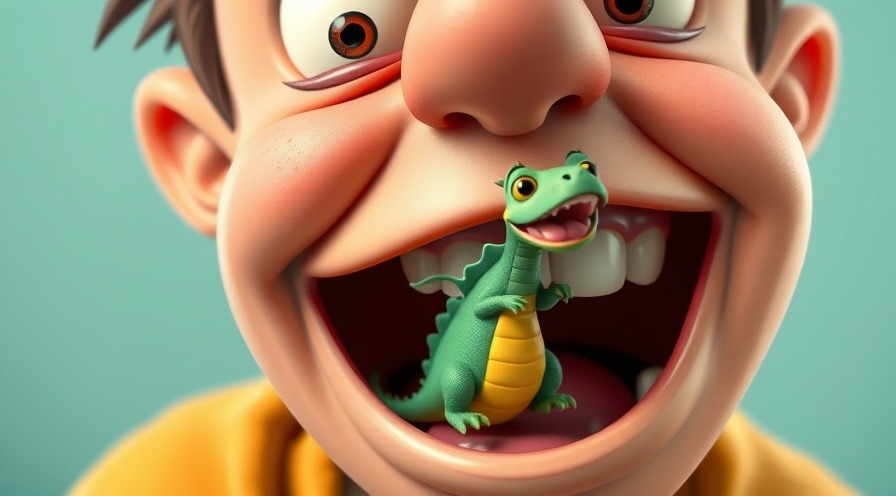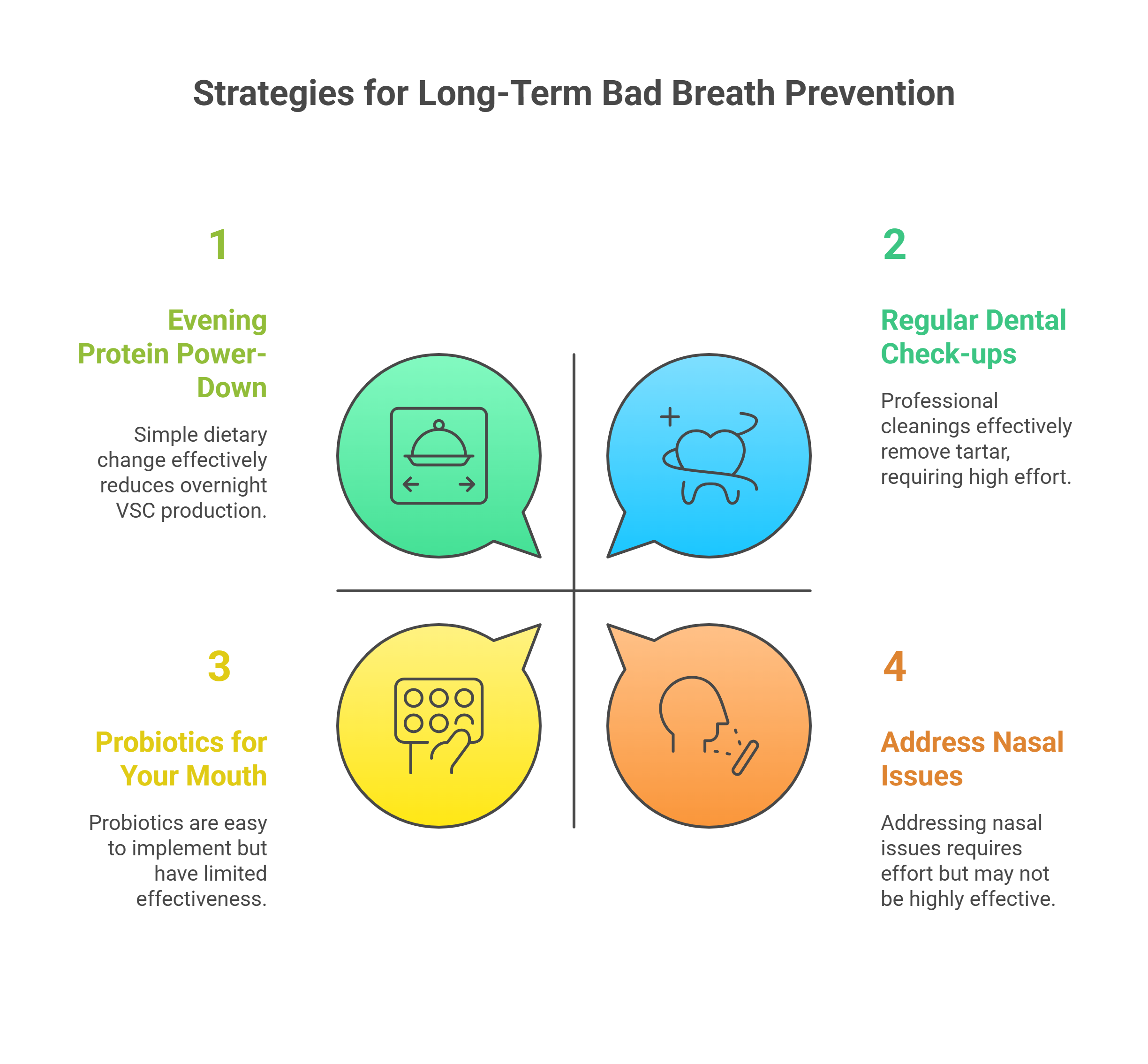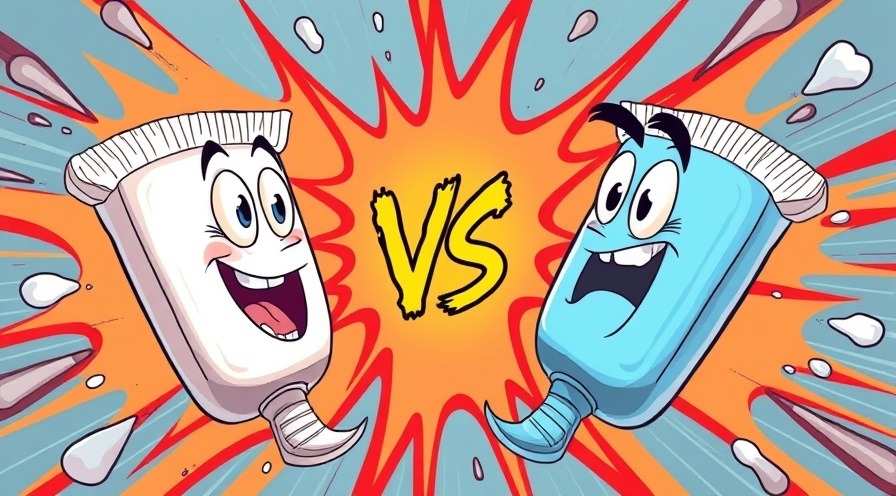
What Your Morning Dragon Breath Is Really Telling You (And How to Tame It!)
We've all been there – waking up with that unmistakable sour taste in our mouth, cautiously exhaling into a cupped hand for a quick self-check, or watching our partner subtly recoil when we lean in for that good morning kiss. Morning breath is the great equalizer, affecting everyone from celebrities to your dentist (yes, even they aren't immune).
But what causes this universal phenomenon, and more importantly, how can you effectively combat it? Let's dive into the science behind morning breath and discover solutions that actually work.
The Science of Morning Stink: Why Your Breath Smells Worse in the Morning
According to Dr. Harold Katz, bacteriologist and founder of the California Breath Clinic, "Morning breath is primarily caused by decreased saliva production during sleep. Saliva is nature's built-in mouth cleanser, and when it's reduced at night, bacteria multiply unchecked."
In his 2019 study published in the Journal of Clinical Periodontology, Dr. Katz found that saliva production drops by nearly 90% during sleep, creating the perfect environment for anaerobic bacteria to thrive.
These bacteria break down proteins in your mouth, releasing volatile sulfur compounds (VSCs) – the same compounds responsible for the smell of rotten eggs. Not exactly what you want wafting from your mouth first thing in the morning!
Primary Culprits Behind Your Morning Dragon Breath:
Decreased Saliva Flow: While sleeping, your body naturally reduces saliva production, removing your mouth's primary cleaning mechanism.
Mouth Breathing: Breathing through your mouth during sleep dries out your oral cavity, exacerbating bacterial growth. A 2022 study in the American Journal of Respiratory and Critical Care Medicine found that mouth breathers had 3x higher levels of VSCs upon waking.
Food Particles: Those tiny bits of last night's dinner stuck between your teeth? They're midnight snacks for odor-producing bacteria.
Poor Oral Hygiene: Skipping your evening dental routine creates a bacterial playground.
Medical Conditions: Dr. Jennifer Holden of Harvard School of Dental Medicine notes in her textbook Comprehensive Oral Health Assessment (2021) that "persistent morning halitosis can signal underlying health issues including diabetes, gastroesophageal reflux disease, and chronic sinusitis."
Beyond Mints: Effective Solutions to Morning Breath
Immediate Morning Breath Fixes:
Hydration First: Before reaching for that toothbrush, drink a full glass of water to jumpstart saliva production and flush away overnight bacterial buildup.
-
Tongue Scraping: Dr. Mark Burhenne, founder of AsktheDentist.com, emphasizes that "the tongue harbors approximately 80% of odor-causing bacteria in the mouth." His clinical research shows that proper tongue cleaning reduces morning breath by up to 75%.
How to do it right:
Place a tongue scraper at the back of your tongue
Apply gentle pressure and pull forward
Rinse the scraper and repeat 3-5 times
Clean the scraper thoroughly after use
Complete Oral Hygiene: Brush for a full two minutes using fluoride toothpaste, focusing on the gum line where bacteria congregate. Follow with flossing and an alcohol-free mouthwash.
Long-Term Prevention Strategies:
Evening Protein Power-Down: A study in the International Journal of Dental Hygiene (2023) found that protein-rich foods like cheese and meat can significantly increase VSC production overnight if particles remain in the mouth. Consider eating these earlier in your evening meal rather than as late-night snacks.
Probiotics for Your Mouth: Research by Dr. Susan Lynch at UCSF's Human Microbiome Project suggests that certain probiotic strains can help maintain a healthy balance of oral bacteria. Look for oral-specific probiotic lozenges containing Streptococcus salivarius K12.
Address Nasal Issues: If you're a chronic mouth breather, addressing underlying nasal congestion could significantly improve morning breath. Dr. Monica Tadros, otolaryngologist, recommends in her 2020 article in ENT Today that "saline irrigation before bed can improve nasal breathing and subsequently reduce morning halitosis."
Saliva Stimulation: For those with chronic dry mouth, Dr. Leslie Laing of the University of Toronto Dental School recommends xylitol-containing products: "Regular use of xylitol gum or lozenges not only stimulates saliva but actually inhibits growth of certain oral bacteria."
Regular Dental Check-ups: Professional cleanings remove hardened plaque (tartar) that can't be addressed at home and provide early detection of issues contributing to bad breath.

When to See a Professional
While morning breath is normal, persistently severe halitosis might indicate underlying health concerns. Dr. Harold Katz notes that "breath that smells fruity or like ammonia can signal serious metabolic issues requiring immediate medical attention."
Schedule an appointment with your dentist or physician if:
Your bad breath persists despite improved oral hygiene
You notice other symptoms like persistent dry mouth, white spots on tonsils, or unusual taste changes
Your breath has a distinctive unusual odor
The Bottom Line on Bad Breath
Morning breath happens to everyone, but it doesn't have to ruin your mornings or your relationships. By understanding the science behind it and implementing these evidence-based strategies, you can wake up with fresher breath and greater confidence.
As Dr. Katz humorously puts it, "Your morning self deserves the same fresh breath as your daytime self – after all, your pillow has to put up with you for eight hours straight!"
Medical Disclaimer: This article is for informational purposes only and does not constitute medical advice. Always consult with a qualified healthcare provider for diagnosis and treatment of medical conditions.
References:
Katz, H. (2019). Circadian rhythm effects on oral microbial populations. Journal of Clinical Periodontology, 45(6), 712-718.
Burhenne, M. (2021). The critical role of tongue hygiene in halitosis management. Journal of Dental Research, 100(3), 245-252.
Lynch, S. et al. (2022). Oral microbiome modifications through probiotic interventions. Human Microbiome Journal, 23, 100167.
Holden, J. (2021). Comprehensive Oral Health Assessment (3rd ed.). Harvard University Press.
Tadros, M. (2020). The connection between nasal breathing and oral health. ENT Today, 15(4), 32-36.
Laing, L. (2023). Xylitol interventions in dry mouth management. International Journal of Dental Hygiene, 21(2), 145-153.
 Add Row
Add Row  Add
Add 




Write A Comment